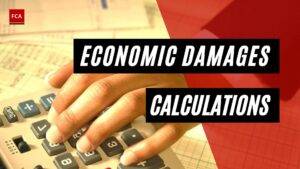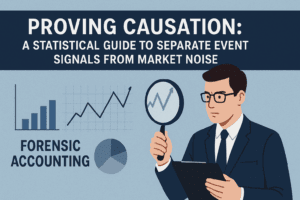Business Valuation for Succession Planning: Protecting the Legacy You’ve Built
Passing down a business is one of the most meaningful decisions an owner will ever make. More than transferring assets, it’s about preserving a lifetime of work, relationships, and reputation. Yet, many business owners enter succession planning without knowing their company’s true worth. A clear, professional business valuation provides the foundation for a smooth transition, helping protect both the business and the family behind it. At Joey Friedman CPA PA, Mr. Friedman and his team help business owners plan with clarity, helping them make sure their legacy continues long after they’ve stepped away.
The Role of Business Valuation in Succession Planning
A business isn’t simply worth what someone is willing to pay. Its true value lies in measurable performance, future potential, and the stability of what’s been built. When it comes to succession, an accurate business valuation sets the tone for fairness, trust, and continuity.
Without it, decisions become emotional. Families can disagree, buyouts may be underpriced, and the company’s future can suffer. A thorough valuation removes that uncertainty. It replaces opinion with evidence, giving all parties a clear understanding of what the business represents financially.
In Florida, where many companies are family-run and generational transitions are common, objective valuation is crucial. It ensures the outgoing owner receives fair compensation while setting successors up for sustainable growth.
What Business Valuation Actually Measures
Business valuation goes far beyond the total of assets and liabilities. It captures the heartbeat of the business, including what drives profit, what sustains growth, and what risks exist.
A professional business valuation accountant looks at several key elements:
- Tangible assets: Equipment, property, and inventory that can be physically measured.
- Intangible value: Brand reputation, intellectual property, and customer loyalty — the invisible strengths behind every thriving business.
- Cash flow patterns: Stable earnings reflect operational consistency and market confidence.
- Market positioning: Where the company stands among competitors and how it’s perceived by customers.
- Leadership readiness: Whether the next generation of management can maintain or improve performance after transition.
As Mr. Friedman explains, “A true valuation isn’t just a number, but a financial reflection of where the business has been and where it’s capable of going.”
Methods Used in Business Valuation
Every business is unique, and so is the method used to measure its value. At Joey Friedman CPA PA, the approach depends on the company’s size, structure, and long-term goals.
Asset-Based Approach
This focuses on what the company owns minus what it owes. It’s ideal for asset-heavy businesses like manufacturing, transportation, or real estate.
Income Approach
This method estimates the value of a company based on its future income potential. It’s used for stable, profit-generating businesses and considers cash flow projections and expected returns.
Market Approach
Similar to real estate comparisons, this approach values a business by analyzing recent sales of similar companies in the same industry.
An experienced CPA evaluates which approach or combination best fits your goals. As Mr. Friedman notes, “Formulas matter, but understanding the story behind the numbers matters more.”
How Business Valuation Strengthens a Succession Plan
A well-prepared valuation doesn’t just assign a dollar figure. It builds a roadmap for transition. Here’s how it supports a smooth and fair process:
Prevents Family or Partner Disputes
Emotions can cloud judgment when ownership changes hands. An independent valuation provides a factual basis for decisions, reducing the risk of misunderstandings between family members or partners.
Simplifies Tax and Legal Planning
Accurate valuation is essential for estate taxes, buy-sell agreements, and ownership transfers. It helps legal advisors structure the transaction in a way that minimizes tax exposure and protects both sides of the deal.
Guides Fair Buyouts or Equity Transfers
When a partner or family member wants to buy out another, valuation ensures neither side overpays or undercuts. Everyone can move forward knowing the deal is balanced.
Builds Investor and Lender Confidence
Financial institutions and investors rely on third-party valuations when financing or approving succession transactions. It demonstrates transparency and professional management.
Preserves the Business’s Reputation
Succession planning done with clarity builds confidence among employees, clients, and vendors. It reassures them that leadership changes won’t affect reliability or financial health.
When to Begin the Valuation Process
Many business owners wait until retirement is on the horizon before starting a valuation. That’s a mistake. A solid succession plan begins years in advance.
Ideally, a business valuation should be done three to five years before the expected transition. This timeline allows owners to correct weaknesses, strengthen financial statements, and raise the company’s market appeal.
Early valuation also helps identify trends, whether cash flow patterns are improving, expenses are rising, or new opportunities exist to enhance value.
For owners in South Florida, where business growth is dynamic and market conditions shift quickly, periodic business valuation in South Florida are invaluable. They help track how external changes, such as real estate values or regional demand, affect long-term worth.
In short, knowing your company’s value early gives you the power to plan, adjust, and make the right decisions before it’s too late.
The Role of a CPA Firm in Business Valuation
Business valuation requires more than spreadsheets. It demands experience, objectivity, and judgment. That’s why working with a qualified CPA firm is vital.
A firm like Joey Friedman CPA PA brings technical expertise and real-world insight. Mr. Friedman and his team analyze financials, identify hidden value drivers, and translate findings into actionable plans. Their process goes beyond numbers, considering each company’s unique structure, history, and leadership goals.
A skilled CPA also acts as an advisor. They help coordinate with attorneys, financial planners, and family members, ensuring every aspect of the transition aligns with your financial objectives.
Working with a Florida business valuation expert offers reassurance that the results will stand up under scrutiny, whether from buyers, partners, or the IRS.
Common Mistakes Business Owners Make During Valuation
Even successful owners can fall into traps during the valuation process. Here are common mistakes to avoid:
- Relying on estimates or emotional pricing: Overvaluing based on sentiment leads to unrealistic expectations.
- Waiting until the last minute: Late valuations limit your ability to improve profitability or reduce liabilities.
- Ignoring intangible assets: Brand value, contracts, and goodwill can represent a significant portion of total worth.
- Skipping professional help: DIY tools can’t account for market conditions, industry trends, or the nuances of private companies.
- Not updating the valuation: A company’s worth changes as the market shifts. Periodic reassessment keeps your strategy relevant.
Avoiding these mistakes protects both your financial future and your peace of mind.
Preparing for a Smooth Transition
Once the valuation is complete, it’s time to plan what comes next. Succession isn’t just a financial handover. It’s an emotional shift. The transition should feel stable for both the outgoing and incoming leadership.
Steps to consider include:
- Outlining clear roles for new leaders.
- Communicating plans with transparency to staff and clients.
- Gradually transferring responsibilities to build confidence.
- Updating legal documents and buy-sell agreements to reflect the latest valuation.
A professional valuation helps turn an uncertain process into a structured, calm progression. With the right planning, you’re not just stepping away. You’re setting the next chapter up for success.
Why Acting Early Matters
The earlier you begin, the more options you have. Early valuation gives you time to increase value, whether by paying down debt, expanding into new markets, or improving margins. It also prevents rushed decisions that often lead to regret.
For growing companies in Miami, a regular business valuation Miami review ensures you stay aligned with current market trends. It helps you understand whether your company’s value is rising with your efforts or being pulled down by unseen risks.
Succession planning isn’t an end. It’s a transformation, and valuation is the compass that keeps it on course.
Conclusion
Every business tells a story of late nights, tough calls, and steady growth. A proper valuation makes sure that the story is honored, not lost.
Business valuation isn’t about selling; it’s about protecting. It provides clarity, prevents conflict, and helps owners transition with confidence. Whether your goal is retirement, legacy preservation, or family harmony, understanding your company’s worth is the first step toward lasting stability.
If you’re planning for retirement or preparing your company for the next generation, reach out to Joey Friedman CPA PA today.
Mr. Friedman and his team specialize in professional business valuation services designed to protect your legacy and prepare your successors for long-term success.
Contact Joey Friedman CPA PA to schedule a confidential consultation and learn how a clear valuation today can shape a stronger tomorrow.




